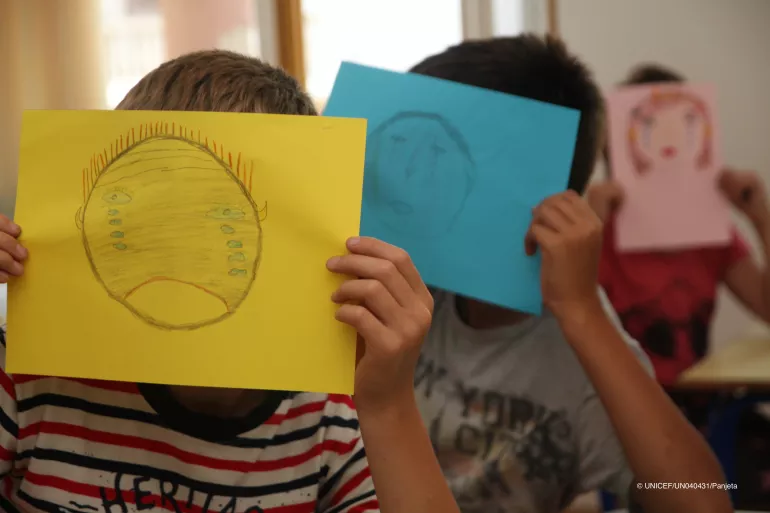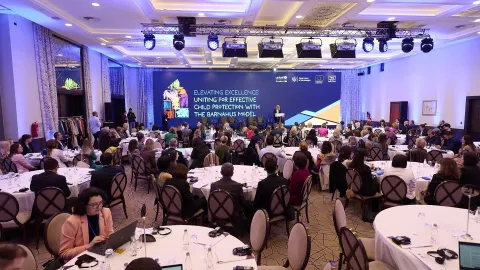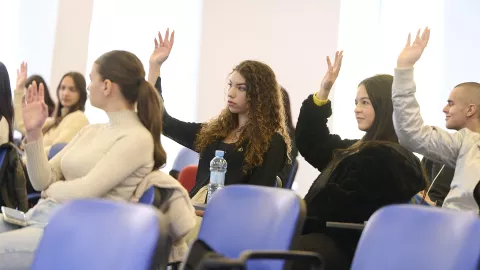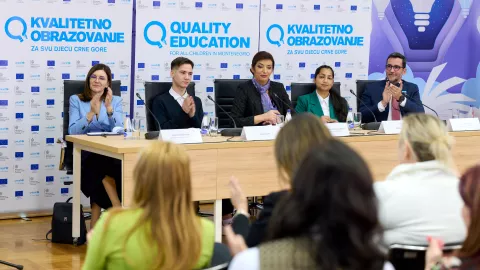Suicides are preventable
UNICEF is calling for the state to ensure that early signs of risks to children’s wellbeing are detected in a timely manner and that the child and the family are provided with adequate health, child protection and education services to prevent a tragedy

- Available in:
- Crnogorski
- English
- Shqip
PODGORICA, 25 October 2022 – Having in mind recent suicides and suicide attempts among children in Montenegro, UNICEF is calling for the state to ensure that early signs of risks to children’s wellbeing are detected in a timely manner and that the child and the family are provided with adequate health, child protection and education services to prevent a tragedy happening.
“Suicides are preventable. We urge the national and local authorities to provide quality child, family support and mental health services to prevent suicides, and to ensure that children at risk, and their families, receive timely and quality professional support,” UNICEF Montenegro Representative Juan Santander said.
In Montenegro, UNICEF has supported the establishment of the National SOS Child Helpline 116-111 and the National SOS Parent Helpline 080 888 888. Over the years, UNICEF has supported the strengthening of the capacities of health, social work and education professionals, as well as the design and expansion of services reaching out and supporting children and families. These services must include home visits, family outreach worker service and counselling. With UNICEF’s support, parenting programmes have also been introduced to help caregivers constructively resolve various issues related to raising children. UNICEF has also supported the strengthening of socio-emotional life skills in adolescents through the in-school and out-of-school programme My Values and Virtues, so that every child has opportunities to learn to recognize and manage different emotions effectively.
However, as pointed out in the last EU Progress Report, Montenegro is still struggling with the limited availability and reach of child, family, victim support and mental health services, and the sustainability of the existing services is questionable.
For these reasons, UNICEF is calling for the state to fully meet its obligations from the Convention on the Rights of the Child and ensure the right of every child to life, growth and optimal development. This means that every child and family should be able to access quality child, family, mental health and victim support services. To this end, UNICEF is also appealing for an urgent increase in the number of child and family support outreach workers, child psychologists and psychiatrists across the country.
Children and families in need must be aware at all times of where and to whom they can turn for full support and protection in case they need to. For this reason, UNICEF Montenegro’s young reporters participated in the promotion of the National SOS Child Helpline 116-111. Last week, they spoke to their peers about mental health issues and the video with the voices of Montenegro’s young people on this topic is available here.
“I would recommend to my peers and all young people not to fight their internal battles alone. Seek help or advice, because it is easier when the problem is shared with a trusted person, be it a parent, friend, teacher, or even the free SOS support line for children and young people, available to everyone. You should not be ashamed and be a slave to the stigmatization common in society. This type of help should not be experienced as a defeat or failure, but as a proof of courage, because it is the only way to solve the problem and restore faith in life. Because life is beautiful. And remember, the world rests on us, the young,” said Manja Čalija, a UNICEF Montenegro young reporter involved in the production of the video with the opinions of Montenegro’s adolescents on mental health.
According to last year’s UNICEF global report The State of the World’s Children 2021; On My Mind: promoting, protecting and caring for children’s mental health, more than one in seven adolescents aged 10–19 globally is estimated to be living with a diagnosed mental disorder, and almost 46,000 adolescents globally die from suicide each year – among the top five causes of death for their age group.
The COVID-19 pandemic has worsened the mental health situation for people all over the world. While protective factors, such as loving caregivers, safe school environments and positive peer relationships can help reduce the risk of mental disorders, this UNICEF global report warns that significant barriers, including stigmatization and lack of funding, are preventing too many children from accessing the support they need for their mental wellbeing.
Therefore, for a national response to be effective, different sectors – health, education, social and child protection, the police, the judiciary and the media – all need to work together continuously to ensure that high-quality child and family support and mental health services are provided to families all over Montenegro. National and local authorities are responsible for ensuring adequate funding for this purpose.
Media contacts
About UNICEF
UNICEF promotes the rights and wellbeing of every child, in everything we do. Together with our partners, we work in 190 countries and territories to translate that commitment into practical action, focusing special effort on reaching the most vulnerable and excluded children, to the benefit of all children, everywhere.
For more information about UNICEF and its work for children, visit www.unicef.org.




